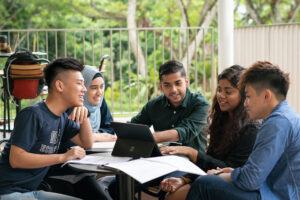Graduate Diploma
 Our Graduate Diploma programme is suitable for those seeking a lighter curriculum that offers the essential courses on contemporary Southeast Asia, whilst enabling students to focus on themes and countries of particular interest to them.
Our Graduate Diploma programme is suitable for those seeking a lighter curriculum that offers the essential courses on contemporary Southeast Asia, whilst enabling students to focus on themes and countries of particular interest to them.
Thus, our programme will suit professionals who wish to develop their knowledge of the region and to upgrade their cross-cultural skills in order to advance their career. A Graduate Diploma in Contemporary Southeast Asia will add regional expertise and international networks to their professional portfolio.
With our flexible study option, students can subsequently seek admission to the MA coursework degree programme and augment the courses earned in the Graduate Diploma programme with additional courses to fulfil the MA coursework degree requirements.

